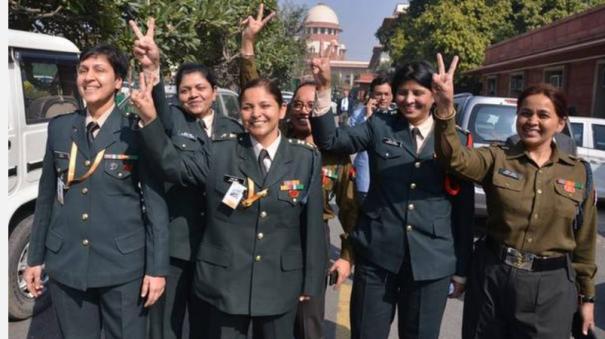NEW DELHI: In a landmark verdict, the Supreme Court on Monday directed the Centre to grant permanent commission to all women officers in the Army within three months, terming the government’s argument of physiological limitations and social norms for denying them command posts as “disturbing”.
The court said women officers in the past have brought laurels to the country and change of mindset is required on the part of the government to put an end to gender bias in armed forces.
A bench headed by Justice D Y Chandrachud said there will not be any absolute bar on giving women command postings.
The top court said despite there being no stay on the 2010 Delhi High Court verdict allowing grant of permanent commission to women officers, the Centre showed scant regard in implementing the directive in the past one decade.
It said engagement of women officers in the Army has been an evolutionary process and the Union of India should have acted in accordance with the Delhi High Court judgment when there was no stay on it.
“There is no reason and justification for the union of India not to act as per the Delhi High Court verdict. On September 2, 2011, the Supreme Court has clarified this aspect and said there is no stay on the high court verdict. Despite that scant regard has been paid to the verdict of Delhi High Court and the order of Supreme Court as well,” the bench said.
The bench said it is of the opinion that physiological features of women have no effect in granting permanent commission and they have to be given equal opportunity at par with their male counterparts in the armed forces.
The top court said even after 70 years of post-colonial era, there is a need for change in mindset with regard to giving equal opportunity to women officers in the Indian Army.
It said the Centre’s submission of physiological limitation is based on flawed notion and there is no constitutional basis to deny them equal opportunity.
It said women officers have brought laurels to the country and several gallantry, sena medals and UN Peace Keeping awards for their contribution in armed forces and to cast aspersion on them on the basis of physiological features is wrong as based on fallacy.
The bench, however, clarified that deployment of women officers in combat role is a matter of policy as held by the Delhi High Court and the competent authority has to look into it.
The top court said permanent commission can be given to women officers in the Army irrespective of their tenure of sevice.
On February 9, serving women officers in the Indian Army had countered the Centre’s stand in the apex court on denying command posts to women on the ground of their physiological limitations, terming it not only “regressive but also completely contrary to the demonstrated record and statistics”.
In their written submission to the court, the women officers had sought rejection of the submission of the Centre and said it is unfortunate that such grounds have been raised, which are completely contrary to the demonstrated records of the case.
The women officers had said they have been serving in the 10 Combat Support Arms, for the last 27 to 28 years and have proven their mettle and courage under fire.
The written submission had also said the women officers have demonstrated that they do not lack in any manner in the roles that have been assigned to them.
The women officers had said according to the policy letter dated February 25, 2019, permanent commission to women officers is being confined to “staff appointments only”, as against “criteria appointments/command appointments”.
They had contended that no such confinement of women officers to staff appointments only, has ever been contemplated or notified in any of the advertisements or policy decisions since 1992, when women were first inducted into the Indian Army.
The Centre had submitted a written note in the apex court, containing the proposal of the government, that points out to several issues, including “physical prowess” and “physiological limitations” as challenges for women officers to meet exigencies of service in the Army.
In its written note, the Centre had said that women officers up to 14 years of service would be considered for permanent commissions and further career progression in staff appointments only.
It said women officers above 14 years of service would be permitted to serve up to 20 years without consideration for permanent commission and would be released with pensionary benefits subject to meeting disciplinary and medical criteria. PTI







